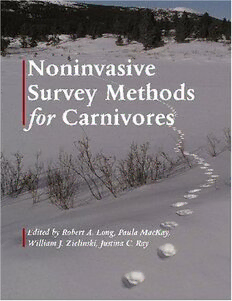Download Noninvasive Survey Methods for Carnivores PDF Free - Full Version
Download Noninvasive Survey Methods for Carnivores by Robert A. Long, Paula MacKay, Justina Ray, William Zielinski in PDF format completely FREE. No registration required, no payment needed. Get instant access to this valuable resource on PDFdrive.to!
About Noninvasive Survey Methods for Carnivores
The status of many carnivore populations is of growing concern to scientists and conservationists, making the need for data pertaining to carnivore distribution, abundance, and habitat use ever more pressing. Recent developments in “noninvasive” research techniques—those that minimize disturbance to the animal being studied—have resulted in a greatly expanded toolbox for the wildlife practitioner. Presented in a straightforward and readable style, Noninvasive Survey Methods for Carnivores is a comprehensive guide for wildlife researchers who seek to conduct carnivore surveys using the most up-to-date scientific approaches. Twenty-five experts from throughout North America discuss strategies for implementing surveys across a broad range of habitats, providing input on survey design, sample collection, DNA and endocrine analyses, and data analysis. Photographs from the field, line drawings, and detailed case studies further illustrate on-the-ground application of the survey methods discussed. Coupled with cutting-edge laboratory and statistical techniques, which are also described in the book, noninvasive survey methods are effi cient and effective tools for sampling carnivore populations. Noninvasive Survey Methods for Carnivores allows practitioners to carefully evaluate a diversity of detection methods and to develop protocols specific to their survey objectives, study area, and species of interest. It is an essential resource for anyone interested in the study of carnivores, from scientists engaged in primary research to agencies or organizations requiring carnivore detection data to develop management or conservation plans.
Detailed Information
| Author: | Robert A. Long, Paula MacKay, Justina Ray, William Zielinski |
|---|---|
| Publication Year: | 2008 |
| ISBN: | 9781597261197 |
| Pages: | 399 |
| Language: | English |
| File Size: | 4.056 |
| Format: | |
| Price: | FREE |
Safe & Secure Download - No registration required
Why Choose PDFdrive for Your Free Noninvasive Survey Methods for Carnivores Download?
- 100% Free: No hidden fees or subscriptions required for one book every day.
- No Registration: Immediate access is available without creating accounts for one book every day.
- Safe and Secure: Clean downloads without malware or viruses
- Multiple Formats: PDF, MOBI, Mpub,... optimized for all devices
- Educational Resource: Supporting knowledge sharing and learning
Frequently Asked Questions
Is it really free to download Noninvasive Survey Methods for Carnivores PDF?
Yes, on https://PDFdrive.to you can download Noninvasive Survey Methods for Carnivores by Robert A. Long, Paula MacKay, Justina Ray, William Zielinski completely free. We don't require any payment, subscription, or registration to access this PDF file. For 3 books every day.
How can I read Noninvasive Survey Methods for Carnivores on my mobile device?
After downloading Noninvasive Survey Methods for Carnivores PDF, you can open it with any PDF reader app on your phone or tablet. We recommend using Adobe Acrobat Reader, Apple Books, or Google Play Books for the best reading experience.
Is this the full version of Noninvasive Survey Methods for Carnivores?
Yes, this is the complete PDF version of Noninvasive Survey Methods for Carnivores by Robert A. Long, Paula MacKay, Justina Ray, William Zielinski. You will be able to read the entire content as in the printed version without missing any pages.
Is it legal to download Noninvasive Survey Methods for Carnivores PDF for free?
https://PDFdrive.to provides links to free educational resources available online. We do not store any files on our servers. Please be aware of copyright laws in your country before downloading.
The materials shared are intended for research, educational, and personal use in accordance with fair use principles.

